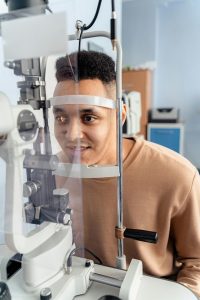If you don’t know the difference between an optometrist and an ophthalmologist, don’t fret. To many Americans, they both sound like a tongue twister!
The short answer?
Optometrists are the primary care doctors of the eye, they focus on prescribing eyeglass/contact prescriptions, diagnosing and managing eye disease, and treating dry eye. They go to 4 years of optometry school and graduate with a doctorate in optometry.
Ophthalmologists are eye surgeons, they not only perform surgery on the eye, but also treat the more severe eye disease cases. Ophthalmologists go to medical school.
There are many similarities between the two professions, but also some important differences.
Let’s take a deeper dive by first discussing their educational paths.
 Educational Path of Optometrists:
Educational Path of Optometrists:
Optometrists begin their training by completing a 4-year college degree. Most graduate with degrees in biology, chemistry or other scientific fields of study. Near the end of college, an aspiring optometrist will take the Optometry Admissions Test (OAT) and then apply to several of the 23 optometry schools in the United States.
Optometry school is 4 years dedicated to the study of the human eye. Optometrists are trained to diagnose and treat eye diseases with medication, corrective lenses and vision therapies.
At the end of optometry school, many optometrists decide to pursue further education by completing an optional, one-year, residency program. Examples of some optometric residency programs include vision therapy, sports vision, brain injury vision rehabilitation, etc.
After their training, optometrists may practice in a variety of practice settings including private and group practice.
Educational Path of Ophthalmologists:
Like optometrists, ophthalmologists begin their training by completing a 4-year college degree. Towards the end of their college career, aspiring ophthalmologists will take the Medical College Admission’s Test (MCAT) and apply to several of the 192+ M.D. or D.O. medical schools in the United States.
Medical school is 4 years dedicated to the study of the entire human body. The first two years are dedicated towards didactic learning of the physiology, pathology and pharmacology of medicine. The third and fourth years are geared towards monthly rotations in various specialties (Family medicine, OBGYN, psychiatry, ophthalmology, etc.) where medical students learn medicine “at the bedside”.
Towards the end of medical school, an aspiring ophthalmologist will apply to an ophthalmology residency program. The first year is called a transition/preliminary year which is generally a year of internal medicine or general surgery. The next 3 years are specific to ophthalmology. During this time, ophthalmologists learn how to diagnose and manage eye disease and also perform surgery such as cataract, pterygium, LASIK, PRK, etc.
At the end of residency, ophthalmologists may decide to pursue further education by completing an optional fellowship in an area of their choice (Retina/vitreous, oculoplastics, cornea, etc.
At the end of training, ophthalmologists may practice in a variety of settings including private practice, group practice, inpatient care and more.
Side by Side Comparison
| Optometrist | Ophthalmologist |
| 4 Years undergraduate degree (BS or BA) | 4 Years undergraduate degree (BS or BA) |
| Standardized test: Optometry Admissions Test (OAT) | Standardized test: Medical College Admissions Test (MCAT) |
| 4 years optometry school | 4 years medical school |
| *Optional* 1-year residency (Vision therapy, contact lens, ocular disease, etc.) | 4 years ophthalmology residency |
| *Optional* 1-2 year fellowship (Retina/vitreous, Cornea, etc.) |
What does an Optometrist & Ophthalmologist do?
Once fully trained, both optometrists and ophthalmologists are able to independently diagnose and treat eye disease. Optometrists however, are better trained in prescribing glasses and contact lenses, while ophthalmologists focus more on sight restoring surgeries and managing severe eye disease cases.
Optometrists frequently work with ophthalmologists to provide comprehensive eye care for their mutual patients. Optometrists will refer their patients to opthalmologists for surgical or medical care of serious eye disease. Conversely, ophthalmologists will refer patients to optometrists for primary eye care, refractions, contact lenses, prescription eyeglass lenses, glasses fittings, and postsurgical care.
In addition to comprehensive eye exams for you and your family, our Mill Creek optometrists at Mill Creek Family Eye Center specialize in eye disease detection and treatment, contact lenses (including specialty fit contact lenses for eye disorders), myopia management, dry eye treatment, and post refractive surgery care. If surgery is needed, our office will refer you out to one of our many trusted ophthalmologist connections in the Mill Creek, Snohomish, Everett, & Lynwood area.

 Educational Path of Optometrists:
Educational Path of Optometrists: 